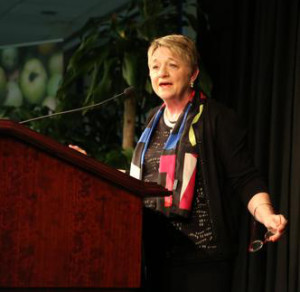Recent weeks have seen renewed interest in the Cooperative Baptist Fellowship’s 16-year-old policy that prohibits the intentional hiring of non-celibate gays and lesbians. Here’s a recap of how the 1,800-church Fellowship got to where it is today on the LGBTQ question, a topic dividing many Christian denominations in the United States and around the world.
Formed in the aftermath of a decade of strife between factions in the Southern Baptist Convention, the Cooperative Baptist Fellowship early on decided not to pass resolutions at national or state assemblies as is common with other Baptist groups. In time detractors would seize on that practice to accuse the CBF of being soft on issues like abortion, homosexuality and biblical authority. Critics presented silence as an indication of tacit approval, or at least accommodation, of social and theological liberalism. CBF leaders responded initially by addressing hot-button topics in Q&A formats on the Fellowship’s website.
At its 1994 General Assembly, the CBF released its first “resource packet” titled HIV/AIDS Ministry: Putting a Face on AIDS. The 80-page resource referred to homosexuality as an “orientation” rather than a “lifestyle,” and included quotes such as “a person does not choose to be homosexual or heterosexual” and “we do not choose our sexual orientation, but rather we ‘awaken’ to it.”
But an allocation of $7,000 for the Baptist Peace Fellowship was deleted from the 1995-96 CBF budget just before the Fellowship opened its 1995 General Assembly in Fort Worth, Texas, because the peace group had recently adopted a statement welcoming gays and lesbians as a matter of social justice and encouraging churches to do the same. “That is not why we funded them in the beginning,” CBF Coordinator Cecil Sherman told the CBF Coordinating Council on July 20, 1995. Sherman, a former pastor and the first CBF coordinator, said the Baptist Peace Fellowship had broadened its agenda beyond “any normal understanding of peace.” Funding was later restored as a line item for specific projects but not as institutional support.
Like what you’re reading? We can’t do it without you.
Support Conversations That Matter.
Donate to our Annual Fund.
In 1999 the second CBF coordinator, Daniel Vestal, responded to repeated criticism of the CBF by publicly calling on a Missouri Baptist layman named Roger Moran to cease distributing “relentless and unwarranted attacks” insinuating “that the real mission of the Cooperative Baptist Fellowship is to promote the gay-lesbian lifestyle, abortion on demand and even child pornography.”
In his address at the 2000 CBF General Assembly in Orlando, Fla., Vestal estimated that 5,000 churches were poised to leave the Southern Baptist Convention and switch loyalty to the Cooperative Baptist Fellowship in protest of revisions to the Baptist Faith and Message confessional statement previously updated in 1963.
On July 25 that year, Vestal released a statement criticizing a Baptist Press story that came out during the previous month’s General Assembly reporting that CBF “will continue funding a pro-homosexual organization whose booth was prominently featured at the CBF’s General Assembly and another group whose immediate past president suggested that homosexuals can be called to the pastorate.” The story, written by BP correspondent Russell Moore — at the time a doctoral student and today head of the SBC Ethics and Religious Liberty Commission — cited curriculum produced and distributed by the Baptist Peace Fellowship and the Alliance of Baptists titled “Rightly Dividing the Word of Truth: A Resource for Congregations in Dialogue on Sexual Orientation,” as well as comments attributed to a past president of Baptist Women in Ministry. “The Cooperative Baptist Fellowship has never issued any statement, taken any action, or spent a single dollar that was intended in any way to condone, endorse or promote the gay-lesbian lifestyle,” Vestal said in a statement on the CBF website, reverting to earlier terminology.
In October, the CBF Coordinating Council voted to adopt a “statement of organizational value” disallowing the expenditure of funds for organizations that “condone, advocate or affirm homosexual practice” or the “purposeful” hiring of non-celibate gays as CBF staff or missionaries. Vestal said the policy was prompted by a phone call from a pastor just before the 2000 General Assembly who said he planned to introduce a motion to defund the new Wake Forest University School of Divinity because of its open-admissions policy toward gays and lesbians. Following a meeting, the pastor agreed not to spark controversy at the annual gathering if CBF leaders would deal with the issue. Commenting that he had already “given an inordinate amount of time” to the CBF’s position on homosexuality, Vestal said it was time for the Fellowship to address the issue as an organization.
“We are being defined by our enemies on the right and our friends on the left,” he said. Noting that only a few CBF churches would ordain a gay person or bless a same-sex union, Vestal added, “We have reached a consensus in our congregations about this, but we have not reached a consensus as an organization.”
The Coordinating Council debated the recommendation before passing it by a vote of 35-23. Council leaders interpreted the relatively close margin as not a referendum on homosexuality but a difference of opinion about whether the CBF should depart from its practice of not passing resolutions and leaving decisions about moral and ethical issues up to the local church.
The 2001 General Assembly upheld the hiring policy after two attempts to rescind it. A motion to reverse the hiring ban by Coordinating Council member Dixie Lea Petrey of Knoxville, Tenn., prior to the General Assembly failed by a vote of 38-13, but the council did change the language used to describe the policy from an “organizational value” to a “personnel and administrative funding policy” — an attempt to clarify that it was not intended to speak on behalf of the Fellowship as a whole.
A motion from the floor of the General Assembly to postpone and review the policy was debated for an hour before going down in defeat by a vote of 701-502. Supporters of the motion said a policy statement condemning homosexuality was the kind of “creedalism” that CBF members had sought to get away from in the SBC in the first place, while opponents warned that many churches would not support a missionary-sending organization that affirmed lesbians and gays and that reversing the policy would signal “the beginning of the end of CBF.”
CBF leaders turned down a proposal offered in 2008 by Wake Forest Divinity School professor Frank Tupper for a workshop on “Homosexuality and the Church” at the 2009 CBF General Assembly in Houston, but a workshop at the 2010 General Assembly in Winston-Salem, N.C., called “A Family Conversation about Same-Sex Orientation” drew a standing-room-only crowd. Due to high interest, CBF leaders decided it was time for a “larger conversation” and for expanding the focus beyond same-sex attraction to the broader question of Christian sexuality.
In her final address to the CBF Coordinating Council, outgoing CBF moderator Colleen Burroughs offered parting thoughts in February 2012 suggesting it was time to “have a conversation” about whether to reverse the policy against hiring gays. “I find the policy to be divisive, unenforceable and probably not Baptist,” she said at the time.
Vestal defended the 12-year-old hiring ban. “Except for a small handful of Baptist churches, the vast majority of churches that partner within CBF will not call/hire/ordain a practicing gay/lesbian Christian as pastor or ministering staff member,” he said in March 2012. “It is because of our desire both to serve these churches and extend their ministry around the world that CBF does not ‘allow for the purposeful hiring of a staff person or the sending of a missionary who is a practicing homosexual.’”
CBF co-sponsored “a [Baptist] Conference on Sexuality and Covenant” with Mercer University’s Center for Theology and Public Life April 19-21, 2012, at First Baptist Church in Decatur, Ga. Mercer professor David Gushee, the lead planner of the conference who served under contract for a year as theologian-in-residence for CBF, later co-authored a 2014 book titled Changing Our Mind describing his shift from viewing same-sex relationships as immoral to solidarity with the LGBTQ community.
At this year’s CBF General Assembly June 20-24 in Greensboro, N.C., current executive coordinator Suzii Paynter recommended an “Illumination Project” approved by the Governing Board (formerly the Coordinating Council) to develop models for the Fellowship community to air differences not only about the hiring ban but also other hot-button issues dividing churches, denominations and society.
This story has been corrected replace “tabled” in the 12th paragraph with “postpone.”





